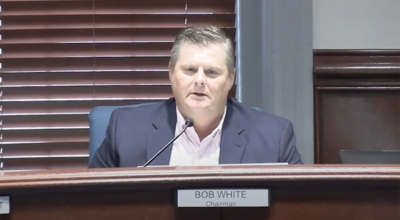CTE, 2018-19 school calendar on BOE agenda
Published 9:45 am Wednesday, April 4, 2018
At their February meeting, Board of Education members directed that letters be written to the state superintendent and to President Donald Trump about the Career and Technical Education (CTE) program, prompted in-part by the President’s State of the Union Address that referenced the importance of job-training and vocational career education.
Assistant superintendent Renee Dowdy read the letters at the board’s March meeting that credited CTE with keeping some students in school. The letters noted that there is a misconception that CTE students “can’t cut it” in the typical curriculum, but those students also receive a rigorous and relevant academic experience. In addition, the letters advocated providing a personalized path to graduation for all students, and that students graduating on a CTE track have as much to celebrate as students graduating on a college track.
The letter to state officials urged the need for policy changes to get away from the “one size fits all” diploma, and the White House letter advocated federal dollars to support CTE initiatives.
However, board member Will Crodick objected to allowing CTE students to take “less” math by substituting carpentry for math courses such as calculus and trigonometry, saying he would rather figure out how to better serve those students who aren’t “getting” math than allowing them to take something less rigorous.
Dowdy pointed out that a school gets penalized in its state report card for having fewer students in the upper level maths, but that the math learned in the carpentry course is more relevant than calculus to students who may be gearing toward construction, HVAC, electrical or plumbing professions.
Board chairman Dr. Bill Dobney commented that not every student needs or wants to go to college and take math courses such as calculus, pointing out that 25 percent of high school graduates go on to a four-year college and of those, 16-17 percent finish. He said it is a disservice to the other students to cater to that 16-17 percent, which he said is what the state is doing with its current graduation requirements.
Instead, the chairman advocated giving students meaningful credentials through the CTE program that can ready them for careers in Currituck County, noting the anticipated need for 200-250 new homes every year in Currituck for the next 20 years. Dobney added that students can earn a good wage in those professions and not have a college debt to pay back.
Board member Dwan Craft commented that some students are having to delay their success by dropping out of high school, getting their GED, then getting CTE training elsewhere, instead of being able to graduate from high school with those CTE credentials.
School superintendent Mark Stefanik commented that research shows that the best way to reach students is to make their education relevant, and that if carpentry math was put side by side with calculus, that it would be difficult to say one was a “higher” or “lower” math than the other.
Everybody in Currituck County deserves a high level of service, Crodick said, and should have a solid education in math, as well as English, history and science. Crodick also asked that his name not be on the letters and was the one no-vote to sending the letters as written.
In other items taken up at the March meeting, board members took a first look at the possible options for the 2018-19 school calendar. Superintendent Stefanik pointed out that one calendar option is pretty much the same as the current calendar, another option gives the elementary and middle schools an early release every other Friday for staff development, similar to the high schools’ calendars that have early release every Friday (but may consider changing to early release on Wednesdays instead). Another option is adding minutes to every school day throughout the year, one way to build in extra time in the event of frequent bad weather days as happened this year.
Crodick suggested that the early release days for elementary and middle school students every other week puts a hardship on parents who work and have to arrange child care for those days and that he didn’t think a half-day of school is as beneficial as a full day.
Staff and citizen input will be gathered before the board makes a decision about the new school calendar.
Superintendent Stefanik reported that while the state has set contract terms for teachers previously, this year local boards of education have options they can consider. He went on to say that the region’s superintendents unanimously favor a contract option that, based on data-driven evaluations, allows a one-year contract to be extended to two-years and then a two-year contract can be extended to four-years. Since the state did away with tenure, Stefanik noted the option gives boards the opportunity to offer multi-year contracts to veteran teachers.
Board members commended the wax museum held at Jarvisburg Elementary and appreciated the thank you notes sent to them from JES students, reported on the enthusiasm at the fifth-grade soap box derby, noted that the CCHS Boosters Club needs volunteers and the chairman and superintendent met with the county’s lobbyist in Raleigh to discuss ways the district can save money.
Student board members Jenna Akers, Keelan Hartmann, Tyler Little and Colin Coffie reported on happenings at each of the county’s schools, including: elementary schools participated in Math 24 and Read Across America events, funds for books were received from the local non-profit Currituck Kids, and spring sports are underway.
Giving the invocation at the start of the meeting was board member Karen Etheridge, who asked for a moment of silence for the victims of the Florida school shooting; asked for continued prayers for the three Currituck County High School students who were involved in a severe highway accident, as other members also added their concerns and said that accounts have been set up to help defray those students’ hospital costs.





